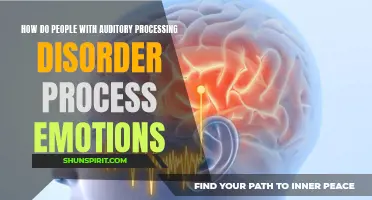
Have you ever noticed that when something causes a strong emotion, it tends to stick in your memory for a long time? Whether it's a joyful event or a traumatic experience, the power of emotion can leave a lasting imprint on our minds. This intriguing phenomenon has fascinated researchers for years and has led to numerous studies exploring how and why strong emotions enhance our ability to remember certain events. In this article, we will delve into the fascinating world of emotional memory and discover the incredible ways in which our emotions shape our recollection of the past.
| Characteristics | Values |
|---|---|
| Attention | Strong emotions increase attention and focus |
| Encoding | Emotionally charged events are encoded more vividly |
| Storage | Emotional memories are stored more effectively and durably |
| Retrieval | Emotion enhances retrieval of memories |
| Vividness | Emotional arousal leads to more vivid and detailed memories |
| Salience | Emotionally significant events are more salient and memorable |
| Contextual cues | Strong emotions provide strong contextual cues for retrieval |
| Autobiographical | Emotion enhances the encoding and retrieval of autobiographical memories |
| Flashbulb | Strong emotional experiences are often remembered as flashbulb memories |
| Selective | Strong emotions can selectively enhance memory for specific details or events |
What You'll Learn

The Impact of Strong Emotion on Memory Retention
Have you ever noticed how certain memories seem to stick with us more vividly than others? Perhaps it's the moment you first fell in love, or the fear you felt during a dangerous situation. These memories, often accompanied by strong emotions, have a way of etching themselves into our minds and remaining there for years to come.
Strong emotions have a profound impact on memory retention. When we experience intense joy, fear, or any other powerful emotion, our brain releases a flood of chemicals that help to consolidate the memory and make it more likely to be retained. This is known as emotional encoding.
During moments of heightened emotion, the amygdala, a small almond-shaped structure in the brain, becomes highly active. The amygdala plays a critical role in emotional processing and is responsible for encoding and storing memories with a strong emotional component. This is why we are more likely to remember emotionally charged events compared to neutral experiences.
But what exactly is it about strong emotions that make memories more durable? One possible explanation lies in the way our brains prioritize information during times of stress or intense emotion. The amygdala's activation leads to a cascade of events that enhances memory consolidation in the hippocampus, a brain region crucial for memory formation. This prioritization ensures that the most salient details and emotions of an event are captured and stored.
Additionally, the release of stress hormones, such as cortisol and adrenaline, during heightened emotional states also affects memory formation. These hormones act as chemical messengers that facilitate the transfer of information from short-term to long-term memory storage. They help to strengthen the connections between neurons involved in memory processing, making it easier for us to recall those memories later on.
The impact of strong emotions on memory retention is not limited to positive experiences. Negative emotions can also have a profound effect on memory formation. In fact, research suggests that negative experiences tend to be remembered more vividly and accurately than positive ones. This phenomenon, known as the "negativity bias," may have evolutionary roots. Remembering and avoiding dangerous or harmful situations are essential for survival and reproductive success.
So, what can we do to harness the power of strong emotions to improve our memory retention? Here are a few strategies you can try:
- Pay attention to your emotions: Be aware of how you feel during certain events or experiences. The more engaged and emotionally involved you are, the more likely you are to remember the details.
- Use visualization and multisensory techniques: Enrich your memories by engaging all your senses. Try to mentally recreate the sights, sounds, smells, and emotions associated with the event. This helps to create a more robust memory trace.
- Find the emotional hook: Identify the emotional component of a task or information you want to remember. Find a way to connect it to a personal experience or a strong emotion to make it more memorable.
- Practice self-reflection: Take the time to reflect on your emotions and experiences. By pausing and consciously processing the emotional aspects of an event, you can enhance memory consolidation.
- Stay positive: While negative emotions can be impactful, fostering positive emotions can also improve memory retention. Finding joy, excitement, or humor in your experiences can help strengthen the emotional component of your memories.
In conclusion, strong emotions have a profound impact on memory retention. The brain's response to intense emotions, combined with the release of stress hormones, enhances memory consolidation and ensures that emotionally charged events remain vivid and accessible in our minds. By paying attention to our emotions, engaging our senses, and finding emotional hooks, we can make use of this natural mechanism to improve our memory retention. So the next time you want to remember something important, try to evoke a strong emotional response – it might just help you remember it for years to come.
The Connection Between Depression and Emotional Abuse
You may want to see also

Brain Mechanisms of Emotional Memory Formation
The brain is a fascinating organ, responsible for many of our cognitive processes, including memory formation. And while we know that emotions play a significant role in our overall memory formation, the specific mechanisms by which this happens have long remained a mystery. However, recent research has shed light on the brain mechanisms of emotional memory formation, providing valuable insights into how strong emotion helps people remember things.
One key area of the brain involved in emotional memory formation is the amygdala. The amygdala is responsible for processing and regulating emotions, and it plays a crucial role in attaching emotional significance to memories. When we experience something emotionally arousing, such as a highly positive or negative event, the amygdala becomes activated, signaling to the rest of the brain that this memory is important and should be remembered.
Another important brain area involved in emotional memory formation is the hippocampus. The hippocampus is responsible for consolidating and storing memories, and it works in conjunction with the amygdala to encode emotional memories. When the amygdala signals that a memory is emotionally significant, it sends a strong neural signal to the hippocampus, enhancing the consolidation of the memory. This is why we often remember highly emotional events more vividly than neutral ones.
In addition to the amygdala and hippocampus, the prefrontal cortex also plays a role in emotional memory formation. The prefrontal cortex is involved in executive functions, such as decision-making and self-control, but it also interacts with the amygdala and hippocampus to modulate the encoding and retrieval of emotional memories. This interaction helps ensure that emotional memories are stored and retrieved accurately, providing us with a reliable representation of past emotional experiences.
So, how exactly does strong emotion help people remember things? It seems that the intense emotional arousal generated by an event activates the amygdala, which then enhances the consolidation of the memory in the hippocampus. This enhanced consolidation makes the memory more salient and vivid, leading to better retention and recall. Additionally, the interaction between the prefrontal cortex and the amygdala/hippocampus ensures that the memory is accurately encoded and retrieved, further enhancing its strength and durability.
Understanding the brain mechanisms of emotional memory formation has significant implications. For one, it helps explain why we tend to remember highly emotional events so well. It also suggests that harnessing the power of emotions can be an effective strategy for enhancing memory formation. For example, incorporating emotionally arousing elements into educational materials or training programs could potentially improve learning and retention.
In conclusion, the brain mechanisms of emotional memory formation provide valuable insights into how strong emotion helps people remember things. The amygdala, hippocampus, and prefrontal cortex work together to encode, consolidate, and retrieve emotional memories, ensuring their salience and accuracy. By understanding and utilizing these mechanisms, we can potentially enhance memory formation for improved learning and retention.
The Power of Emotional Intelligence: Exploring its Attractiveness Factor
You may want to see also

Emotional Arousal Enhancing Encoding and Retrieval of Memories
Emotions play a crucial role in how we remember events and experiences. When we experience strong emotions, it can enhance our ability to encode and retrieve memories associated with those emotions. This phenomenon is known as emotional arousal enhancing encoding and retrieval of memories.
When we encounter something that elicits a strong emotional response, our brain releases stress hormones such as adrenaline and cortisol. These hormones help to sharpen our focus and increase our alertness, leading to better memory formation.
The amygdala, a part of the brain involved in processing emotions, plays a significant role in this process. It helps to consolidate memories by linking them to the emotions experienced at the time of encoding. This emotional tagging makes the memory more vivid and easier to retrieve later on.
Emotional memories are often more detailed and vivid compared to neutral memories. This is because emotions enhance our attention and perception, making us more likely to notice and remember specific details. For example, if you witness a car accident, the shock and fear you experience will likely make the memory of the event more vivid and lasting.
Emotional arousal not only enhances encoding but also facilitates memory retrieval. When we are in a similar emotional state to the one we experienced during encoding, it becomes easier to retrieve memories associated with that emotion. This is known as state-dependent memory.
To make use of the emotional arousal enhancing encoding and retrieval of memories, you can incorporate the following strategies:
- Pay Attention: When you want to remember something important, try to engage your emotions by paying attention to the emotional aspects of the situation. Focus on how it makes you feel and try to connect those feelings to the details you want to remember.
- Visualize: Create mental images that evoke strong emotions. For example, if you are trying to remember a list of items, imagine yourself interacting with each item in a way that elicits emotions. The more vivid and emotional your mental images, the better your memory encoding will be.
- Relate to Personal Experiences: Connect new information to your own personal experiences and emotions. This can help you create stronger emotional links to the new information, making it easier to remember.
- Use Emotional Cues: When you want to retrieve a specific memory, try to recreate the emotional state you were in when you encoded that memory. For example, if you were happy when you learned a particular fact, try to think about something that makes you feel happy before attempting to recall that fact.
- Practice Retrieval: Periodically practice recalling emotional memories to strengthen the connections in your brain. The more you retrieve an emotional memory, the more accessible and vivid it becomes.
- Limit Distractions: Reduce distractions when you need to remember something emotional. Distractions can interfere with emotional memory encoding and retrieval.
In conclusion, strong emotions have a powerful impact on memory. By understanding how emotional arousal enhances encoding and retrieval of memories, we can leverage this phenomenon to improve our memory and retention of important information. Incorporate these strategies into your daily life to make the most of your emotional memories.
Healing the Wounds: Restoring a Marriage After an Emotional Affair
You may want to see also

The Role of Emotion in Creating Vivid and Lasting Memories
Emotions play a crucial role in our everyday lives. They shape our experiences and influence our behavior. One area where emotions have a particularly powerful impact is in memory formation. Strong emotions can create vivid and lasting memories that stay with us for a lifetime.
When we experience an event that elicits a strong emotional response, the amygdala, a part of the brain responsible for processing emotions, becomes highly activated. This activation triggers the release of stress hormones, such as adrenaline and cortisol, which enhance our focus and attention.
This heightened state of arousal allows us to pay closer attention to the details of the event, making the memory more vivid and detailed. The release of stress hormones also strengthens the connections between the neurons in our brains, making the memory more robust and easier to retrieve.
Imagine a scenario where you witnessed a car accident. The shock and fear you felt in that moment would likely cause your amygdala to be activated, resulting in a surge of adrenaline and cortisol. This emotional response would enhance your focus and attention, allowing you to remember even the smallest details of the accident, such as the color of the cars involved or the sound of screeching tires.
Furthermore, strong emotions can also influence the encoding of memories. Encoding refers to the process of transforming sensory input into a form that can be stored in our memory. When we experience something emotionally significant, our brains release neurotransmitters that enhance memory consolidation.
For example, if you were to receive a surprise birthday party, the excitement and joy you feel in that moment would trigger the release of dopamine, a neurotransmitter associated with reward and pleasure. This surge of dopamine would strengthen the connections between the neurons involved in the memory formation process, making the memory more likely to be retained for years to come.
Emotion also plays a role in memory retrieval. When we retrieve a memory, our emotional state at the time of retrieval can influence the vividness and accuracy of the memory. Studies have shown that when we are in a similar emotional state as we were when the memory was formed, our ability to retrieve the memory is enhanced.
For instance, if you were to visit the place where you went on your honeymoon, the feelings of love and happiness you experienced during that time would likely help you recall the details of that trip more easily. The emotions associated with the memory serve as cues that activate the neural networks involved in the original memory formation, making it easier to retrieve.
In summary, strong emotions can have a profound impact on memory formation. They enhance our focus and attention, strengthen the connections between neurons, and influence the encoding and retrieval of memories. By understanding the role of emotion in memory, we can harness its power to create more vivid and lasting memories. So, the next time you want to remember something important, try to make it emotionally significant, and you'll be more likely to remember it for years to come.
Surviving Emotional Abuse from Parents: A Guide to Healing and Self-Discovery
You may want to see also
Frequently asked questions
Strong emotion can significantly enhance memory. When the brain experiences intense emotions, such as fear or excitement, it releases stress hormones like adrenaline and cortisol. These hormones help activate the brain's amygdala, which plays a crucial role in memory formation and storage. This heightened emotional state can lead to more vivid and long-lasting memories.
Absolutely! Both negative and positive emotions can enhance memory. Positive emotions, such as joy or happiness, can create a similar effect on memory as negative emotions. When people experience positive emotions, the brain releases neurotransmitters like dopamine, which can strengthen the neural connections involved in memory formation. This makes positive experiences more memorable.
Not necessarily. While strong emotions can enhance memory, they can also introduce elements of distortion or false memories. The vividness and emotional intensity of an event can lead to heightened recollection, but this does not guarantee accuracy. Memory is subjective and can be influenced by personal biases or post-event information. It's crucial to consider the potential for memory distortion, especially when relying on strong emotional memories.
One way to use strong emotions to improve memory is by connecting new information or experiences to intense emotional states. By creating associations with emotions, one can enhance the encoding and retrieval process. For example, studying while listening to enjoyable music or engaging in physical activities that induce strong emotions can help cement the memory of the information being studied. Additionally, consciously focusing on the emotional aspects of experiences or events can also assist in forming more robust memories.







